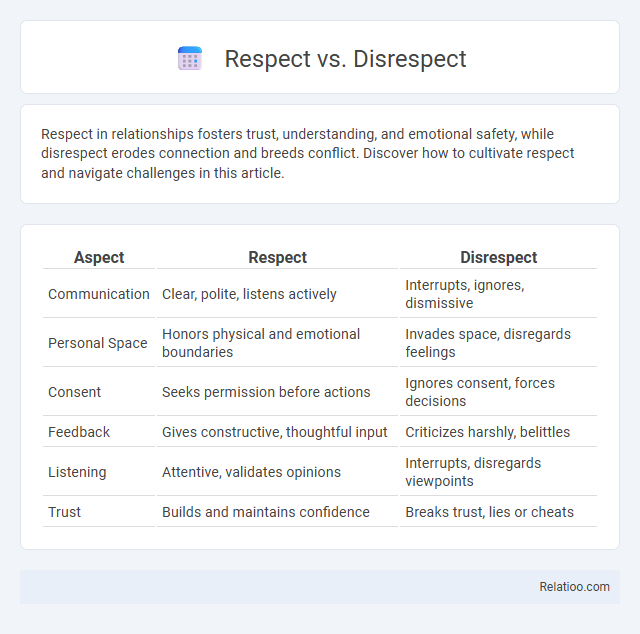Respect in relationships fosters trust, understanding, and emotional safety, while disrespect erodes connection and breeds conflict. Discover how to cultivate respect and navigate challenges in this article.
Table of Comparison
| Aspect | Respect | Disrespect |
|---|---|---|
| Communication | Clear, polite, listens actively | Interrupts, ignores, dismissive |
| Personal Space | Honors physical and emotional boundaries | Invades space, disregards feelings |
| Consent | Seeks permission before actions | Ignores consent, forces decisions |
| Feedback | Gives constructive, thoughtful input | Criticizes harshly, belittles |
| Listening | Attentive, validates opinions | Interrupts, disregards viewpoints |
| Trust | Builds and maintains confidence | Breaks trust, lies or cheats |
Understanding the Essence of Respect
Respect embodies recognizing and valuing others' boundaries, rights, and feelings, fostering trust and positive relationships. Disrespect involves actions or attitudes that dismiss or undermine these boundaries, leading to conflict and alienation. Overstepping occurs when individuals ignore established limits, causing discomfort and eroding mutual respect essential for effective communication and collaboration.
Defining Disrespect in Modern Society
Disrespect in modern society manifests through actions or words that undermine someone's dignity, boundaries, or values, often eroding trust and social cohesion. Unlike respect, which fosters mutual understanding and positive relationships, disrespect can be subtle or overt, including ignoring consent, dismissing opinions, or engaging in harmful stereotypes. Recognizing signs of disrespect helps you establish healthy interactions and maintain personal boundaries without overstepping others' rights or feelings.
The Importance of Respect in Relationships
Respect in relationships fosters trust, understanding, and emotional safety, crucial for healthy connections. Disrespect, such as dismissive behavior or boundary violations, erodes intimacy and can lead to conflict or disengagement. Recognizing and honoring your partner's boundaries prevents overstepping, ensuring mutual appreciation and long-term relationship stability.
Common Signs of Disrespect
Common signs of disrespect include ignoring Your boundaries, speaking in a dismissive tone, and consistently interrupting during conversations. Overstepping respect occurs when personal limits are violated, such as invading privacy or disregarding Your opinions. Recognizing these behaviors helps maintain healthier interactions and reinforces mutual respect.
Psychological Impact of Respect and Disrespect
Respect fosters positive self-esteem, emotional well-being, and trust in relationships by acknowledging Your value and boundaries. Disrespect can lead to feelings of worthlessness, anxiety, and betrayal, which negatively affect mental health and social connections. Overstepping boundaries often causes confusion and distress, intensifying the psychological damage caused by disrespect and hindering personal growth.
Building a Culture of Mutual Respect
Building a culture of mutual respect requires clear boundaries that distinguish respect from disrespect and overstepping. Your actions should consistently demonstrate empathy, active listening, and consideration for others' perspectives to foster trust and understanding. Establishing these principles encourages open communication, reduces conflicts, and promotes a supportive environment where everyone feels valued.
Effective Communication to Foster Respect
Effective communication fosters respect by prioritizing active listening, clear expression of ideas, and acknowledging differing perspectives without judgment. Recognizing boundaries prevents overstepping, ensuring dialogues remain constructive and inclusive. Establishing mutual respect through empathetic interactions reduces misunderstandings and promotes collaboration.
Consequences of Disrespect in the Workplace
Disrespect in the workplace leads to decreased employee morale, increased turnover rates, and reduced productivity. It fosters a toxic environment, resulting in poor communication and collaboration among team members. Persistent disrespect can also trigger legal issues, including harassment claims, damaging the organization's reputation and financial standing.
Strategies for Addressing and Preventing Disrespect
Addressing disrespect effectively requires clear communication of boundaries and consistent enforcement of consequences to prevent overstepping. You can foster respect by promoting empathy and active listening within your relationships, ensuring that all parties feel valued and heard. Implementing proactive strategies such as establishing mutual guidelines and encouraging open dialogue minimizes misunderstandings and reinforces a culture of respect.
Cultivating Respect in Everyday Interactions
Cultivating respect in everyday interactions requires recognizing personal boundaries and valuing others' perspectives without overstepping or dismissing their feelings. Respect fosters positive communication and trust, while disrespect or overstepping can damage relationships and create conflict. Your commitment to empathy and mindful behavior reinforces a respectful environment essential for meaningful connections.

Infographic: Respect vs Disrespect
 relatioo.com
relatioo.com